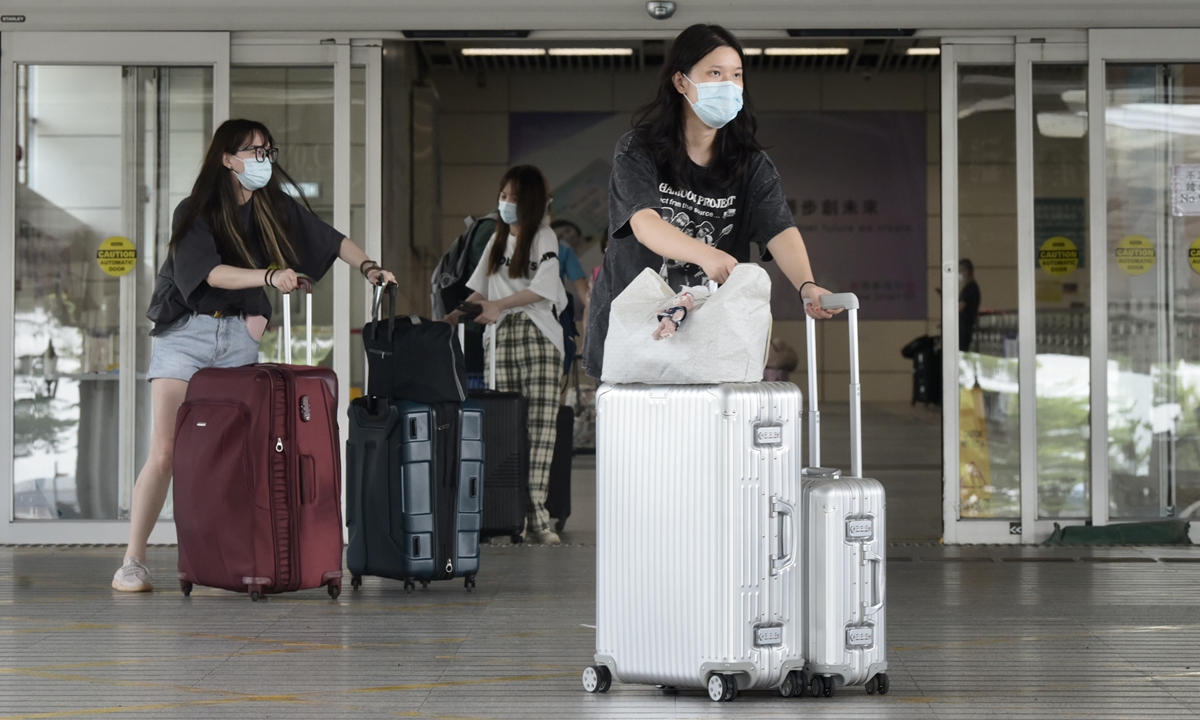
Passengers enter Hong Kong at the Shenzhen Bay Port in September, 2021. Photo: IC
The Hong Kong Special Administrative Region (HKSAR) government is actively considering implementing more relaxed anti-epidemic policies to ensure the maximum connection with the international world, with the designated hotel quarantine measure being expected to be removed for arrivals to Hong Kong.
Experts said it is a good time now for the HKSAR government to loosen its quarantine measures for inbound passengers as the latest wave of the COVID-19 epidemic in Hong Kong ebbs. The adjustment would be a major step for the global business hub's general plan to return to normal.
Hong Kong Chief Executive John Lee Ka-chiu said at a press conference on Tuesday that while the HKSAR government is doing its best to control the spread of COVID-19, he is also aware of the need to ensure that there will be, to a maximum extent, normal activities for Hong Kong society to carry on.
"We aim to have the maximum connection with the international world and also to reduce the inconvenience to people who arrive at Hong Kong," said Lee, when asked if the HKSAR government will cancel the compulsory quarantine at designated hotels for arrivals.
He said that the relevant measures will be announced when they will have made decisions about any adjustment to the current quarantine measures in Hong Kong.
At a separate conference on Tuesday, Huang Liuquan, deputy director of the Hong Kong and Macao Affairs Office of the State Council, said that it is reasonable for the SAR government to optimize the anti-epidemic measures based on analysis of the epidemic situation in Hong Kong and the world, and that there is no need to read too much into any changes.
The current epidemic prevention policies in Hong Kong regulate that inbound people from outside shall go through a "3+4" quarantine procedure, under which they will be subject to compulsory quarantine in designated hotels for three days, followed by medical surveillance at home for four days, with multiple tests during medical surveillance and the monitoring period thereafter.
As Hong Kong sees a decline in daily COVID-19 cases in its sixth wave of epidemic, some Hong Kong experts have suggested the quarantine polices be changed into a "0+7" mode with no hotel quarantine for arrivals, but only seven-day home quarantine.
"Hong Kong now has full conditions to implement the '0+7' plan, and it is important for the city to accelerate its progress of returning to normal and reconnecting to the world," said Jin Dongyan, a virologist and professor of the School of Biomedical Sciences at the University of Hong Kong, who is one of the experts advocating for the adjustment.
Under the "0+7" plan, arrivals should take either a nucleic acid test or antigen test within a certain number of days after entering Hong Kong, Jin told the Global Times on Tuesday.
Those who test positive will be required to continue to stay at home to cut off transmission to the community and reduce the risk to the minimum, he noted.
Given the high vaccination rate in Hong Kong and the large number of people who were naturally infected in the fifth wave, it is estimated that over 95 percent of the population has an immune shield against severe COVID-19 infection, according to an article joint released by Jin and his colleagues from the university, including Yuen Kwok-yung, an expert advisor to the SAR government, according to Hong Kong media.
As of Tuesday, the percentages of population vaccinated with first dose for COVID-19 in Hong Kong is 93.9 percent, while that with second does is 91.6 percent.
The crude death rate of the fifth wave of COVID-19 in Hong Kong was 0.59 percent from the end of 2021 to mid-September in 2022, but it has dropped to 0.097 percent when looking at the data from June till mid-September, said the article.




